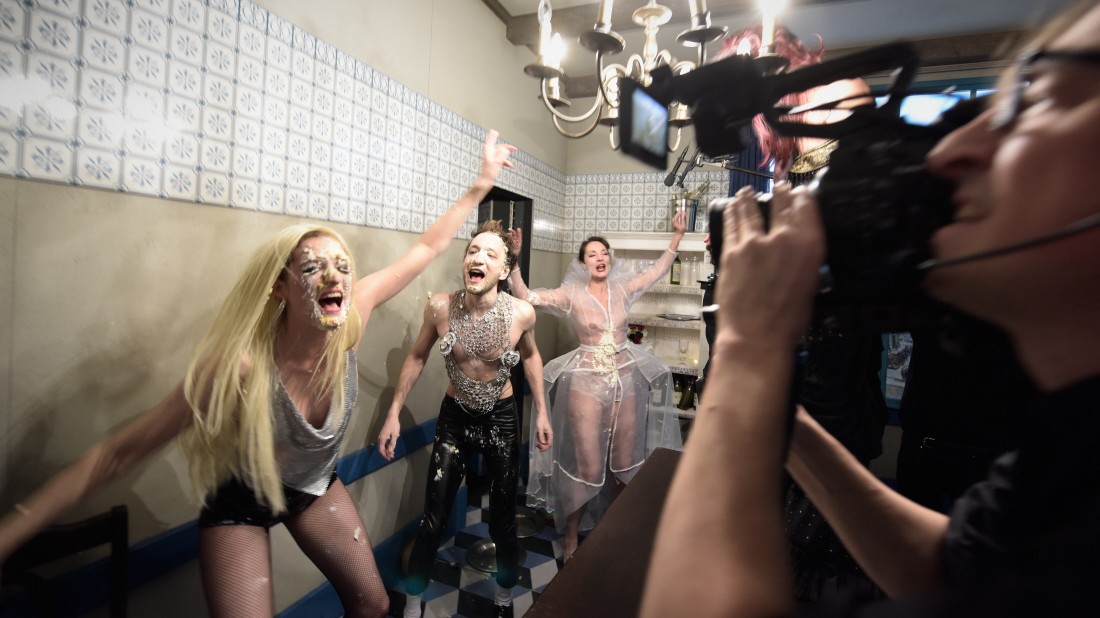Sure, they still exist, the Castorf moments. For example, when Bruno Cathomas gets behind the wheel of a yellow van with “Banania” written on it and maneuvers back and forth like crazy. It has the silly madness of the best Volksbühne times. But such moments are almost as rare as flying pigs this evening. Frank Castorf estimated five hours of pure playing time for his production “Molière. I became a demon, became flesh and disguised as a human being”. Five hours in the Mülheim depot of the Cologne theater. A “very, very long evening”, as Cathomas cheerfully threatens at the beginning.
Molière was born 400 years ago, although Frank Castorf naturally doesn’t need such occasions, after all it’s not his first Molière collage. This time it should be about the whole life of the French comedy writer. And about power relations, about hierarchies, about the obligation of the comedian to offer distraction to the noble gentleman. The actors, apart from the French Jeanne Balibar, all members of the Cologne ensemble, have to tell the biography of the author from birth to death, with dates and all the bells and whistles.
In general, most of them have endless strings of text to chew through, set pieces from various Molière plays, including “Misanthrope” and “The Scholarly Women”, as well as painful texts by Bulgakov and Meyerhold from Father Stalin’s Russia and memories of the Japanese choreographer Tatsumi Hishikata from his childhood in the rice field.
He had “achieved everything I wanted to achieve,” the theater director grumbles: Of course, Castorf speaks for himself
In a scene with his itinerant theater actors, Cathomas, as the wig-wearing Molière, makes the balance of power immediately clear: He has “achieved everything I wanted to achieve,” the theater director roars. Of course, Castorf himself speaks and winks at the audience, whose ass is gradually falling asleep. No expense is spared in terms of stage technology. It ranges from the said van to a giant ass with ears that says “Arc de Triomphe” to Terry Gillam cartoon-like mouth-opening and shutting giant top-hats representing middle-class audiences or something.
Above all, there is a lot of filming and broadcasting: two walk-in containers have been set up on the back wall of the stage. The one on the right is furnished like a 17th century dining room. The one on the left contains a bathtub in which Jeanne Balibar and three male actors bask, dive and rub one another naked for what feels like half an hour. Then the men fight with sticks, this is an interpretation of the argument between the dance, music and fencing masters from “The Citizen as Nobleman”.
Later, Lola Klamroth will throw a cream cake in the other container and fall in one with her face herself. While all of this, projected in close-up onto a screen, takes place humorlessly, the gaze wanders over to static wafts of stage fog hanging in the air. They’re often the best and smartest of what’s happening up front.
Jeanne Balibar forms the center of the evening; however, her German, which she has learned by heart, seems as if she is looking through a pane of frosted glass.
(Photo: Thomas Aurin)
—
Jeanne Balibar is at the center of it all. She staggers around, naked under translucent robes, as a stupid, bourgeois Monsieur Jourdain, is happy to discover that she has spoken prose all her life, sings the GDR hit “Keine Bange (wir holt a pair of pliers)” and – Corona says hello – states: “The cold of the season caught me.” But although it is admirable how an actress acts in a language that is not her own, the ironic mixing of different registers and text types does not work at all. Everything seems obviously memorized. Balibar’s true, glamorous stage aura only really shines when she speaks French. Otherwise she plays as if through frosted glass.
The director is primarily concerned with power; the whole production is one thing: Look what I’m doing here because I can
But Molière’s own brilliance sometimes shines through. Especially when Justus Maier as Cléonte from “Der Bürger als Edelmann” in a Renaissance doublet and underpants, stomping his foot, squeezes out his disappointed love for Lucille Jourdain. Here is a person who feels hurt and humiliated because he thinks his lover has put him aside. And this for the benefit of a man he knows to be of smaller, lesser character than himself, but whom circumstance and convention have placed in a more advantageous position to win Lucille’s favor. Of course, the conflict between the bourgeoisie and the nobility is fought out as an example. But it’s also a deeply human scene that brilliantly captures an extreme emotional state. There really isn’t any room for something that genuine in this infinitely indifferent, self-referential constant trek. And yet it briefly breaks ground.
Somehow this is about power, of course. Above all, Frank Castorf himself demonstrates his power. The whole production is one thing: Look what I’m doing here because I can. “Molière” is a sloppily built giant bucket, brimming with irrelevance. An evening that shows what happens when a super successful theater director gives free rein to every stupid association, regardless of the consequences. When stage sets, props and technology become an end in themselves. When heartbreaking actors are condemned to banging. When Molière is on it, but only Castorf is in it.
–


:strip_exif()/i/2004715584.jpeg?resize=150%2C150&ssl=1)